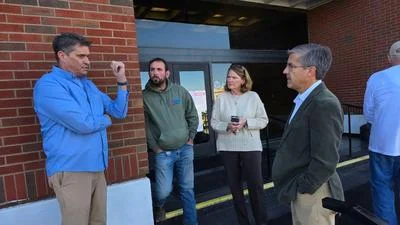Chicago-Kent criminal law professor Richard Kling said Judge Cunnington’s ruling was a forgone conclusion. | https://kentlaw.iit.edu/law/faculty-scholarship/faculty-directory/richard-s-kling
Chicago-Kent criminal law professor Richard Kling said Judge Cunnington’s ruling was a forgone conclusion. | https://kentlaw.iit.edu/law/faculty-scholarship/faculty-directory/richard-s-kling
White County State’s Attorney Denton W. Aud said he is pleased a Kankakee County judge overruled the SAFE-T Act.
He noted that he takes pride in the efforts he and other state's attorneys have made.
"I received the final decision on our lawsuit challenging the constitutionality of the SAFE-T Act and specifically the Pretrial Fairness Act portion of it,” Aud said in a Facebook post. “In essence, it is my joy and honor to inform you that the judge has ruled in favor of myself and the 64 other state’s attorneys, and plaintiff sheriffs, on the majority of the counts of our lawsuit by finding that the Illinois General Assembly attempted to unconstitutionally amend Article 1 Section 9‘s right to bail and Section 8.1’s rights of victims of the Illinois Constitution and has also violated the Illinois Constitution’s separation of powers provisions by infringing on the authority of the judiciary. Consequently, a summary judgment was entered in our favor finding that the Pretrial Fairness Act portion of the SAFE-T Act has been declared unconstitutional. This is a magnificent day for the rule of law and for the People of the State of Illinois. I’m extremely proud of my compatriot state’s attorneys and our lawsuit to restore the constitutional balance of power, protect the community, safeguard the constitutional rights of the citizens, and preserve the rule of law in Illinois.”
Kankakee County Chief Judge Thomas W. Cunnington, of the 21st Judicial Circuit Court of Illinois, was responsible for the ruling. In his decision, he noted that “The administration of the justice system is an inherent power of the courts upon which the legislature may not infringe and the setting of bail falls within that administrative power, the appropriateness of bail rests with the authority of the court and may not be determined by legislative fiat.”
Chicago-Kent criminal law professor Richard Kling said the ruling was a forgone conclusion. “The arguments raised all had merit, they weren’t frivolous,” Kling said, according to the Chicago Sun-Times.
The bill will still take effect on Jan. 1 in the 37 counties not included in the lawsuit, including Cook County. In those counties, thousands of inmates currently being held in jails while they await trial on serious crimes would be released. But after the recent ruling, the 65 counties involved in the lawsuit will not be subject to those provisions of the SAFE-T Act. The Act underwent changes after a campaign communications blitz revealed several glaring errors in the law. No Republicans voted for the bill or the subsequent changes. When the Safe-T Act is implemented in the surviving counties, those charged with the most heinous crimes—such as robbery, kidnapping, arson, second-degree murder, intimidation, aggravated battery, aggravated DUI, aggravated flight, drug-related homicide, and threatening a public official—will be freed, as Will County Gazette previously reported.




 Alerts Sign-up
Alerts Sign-up